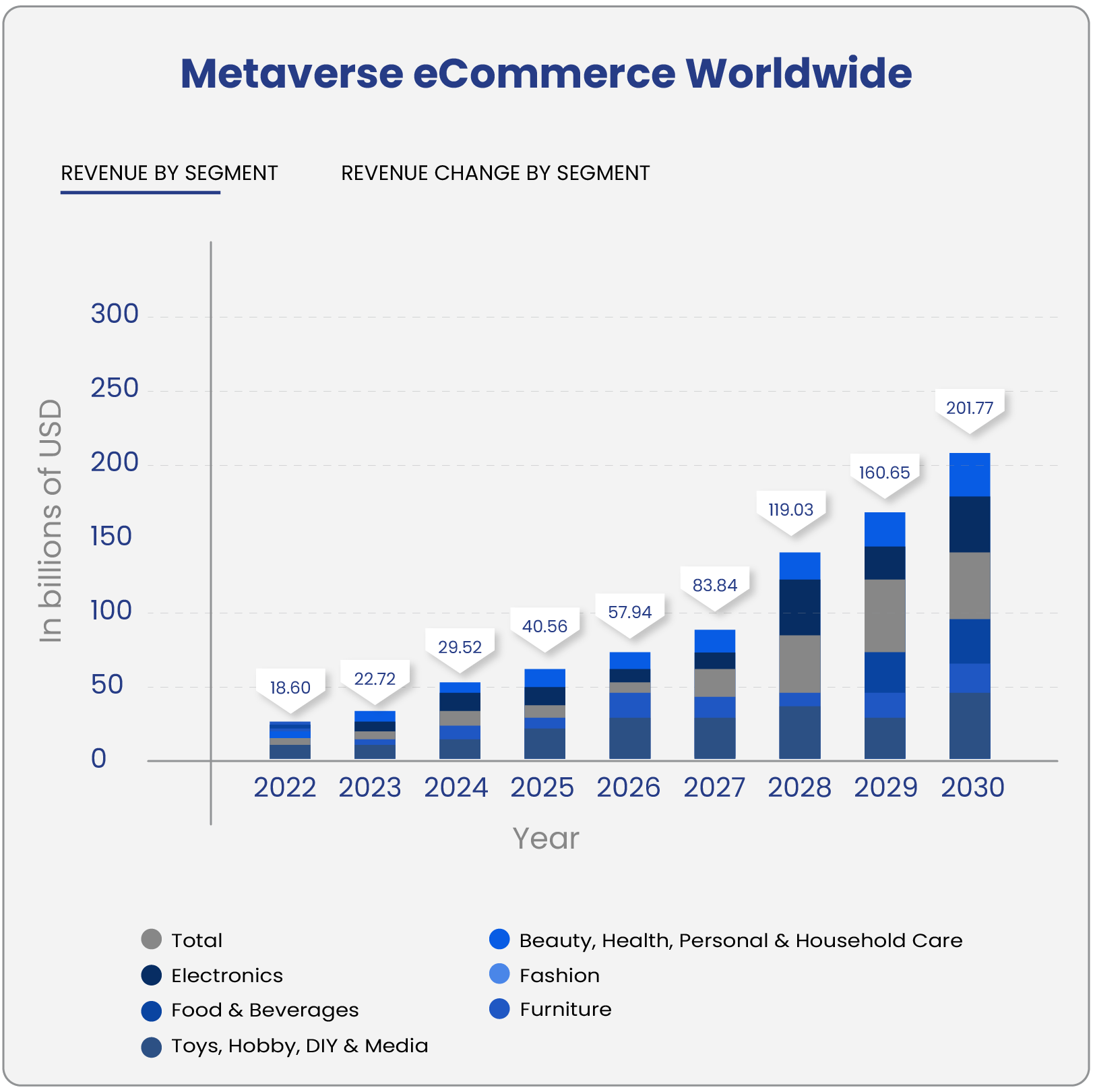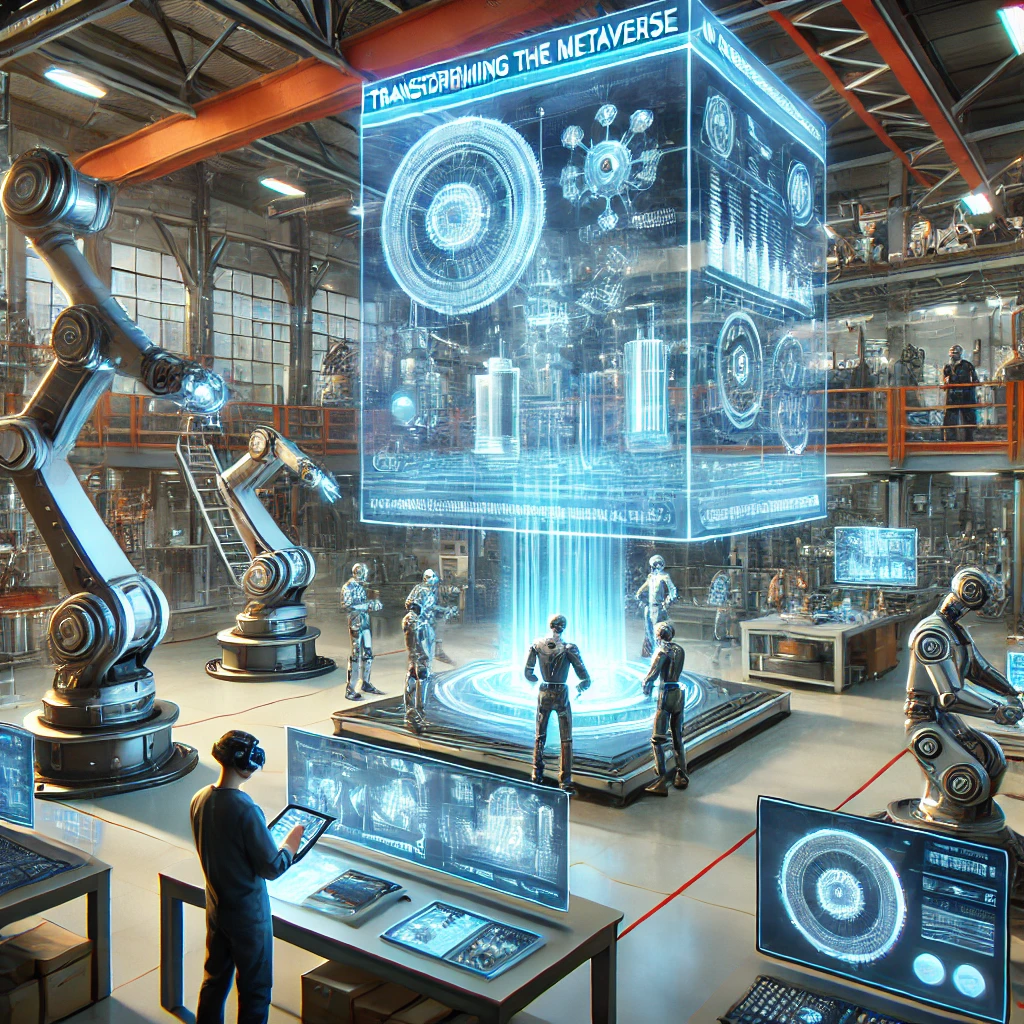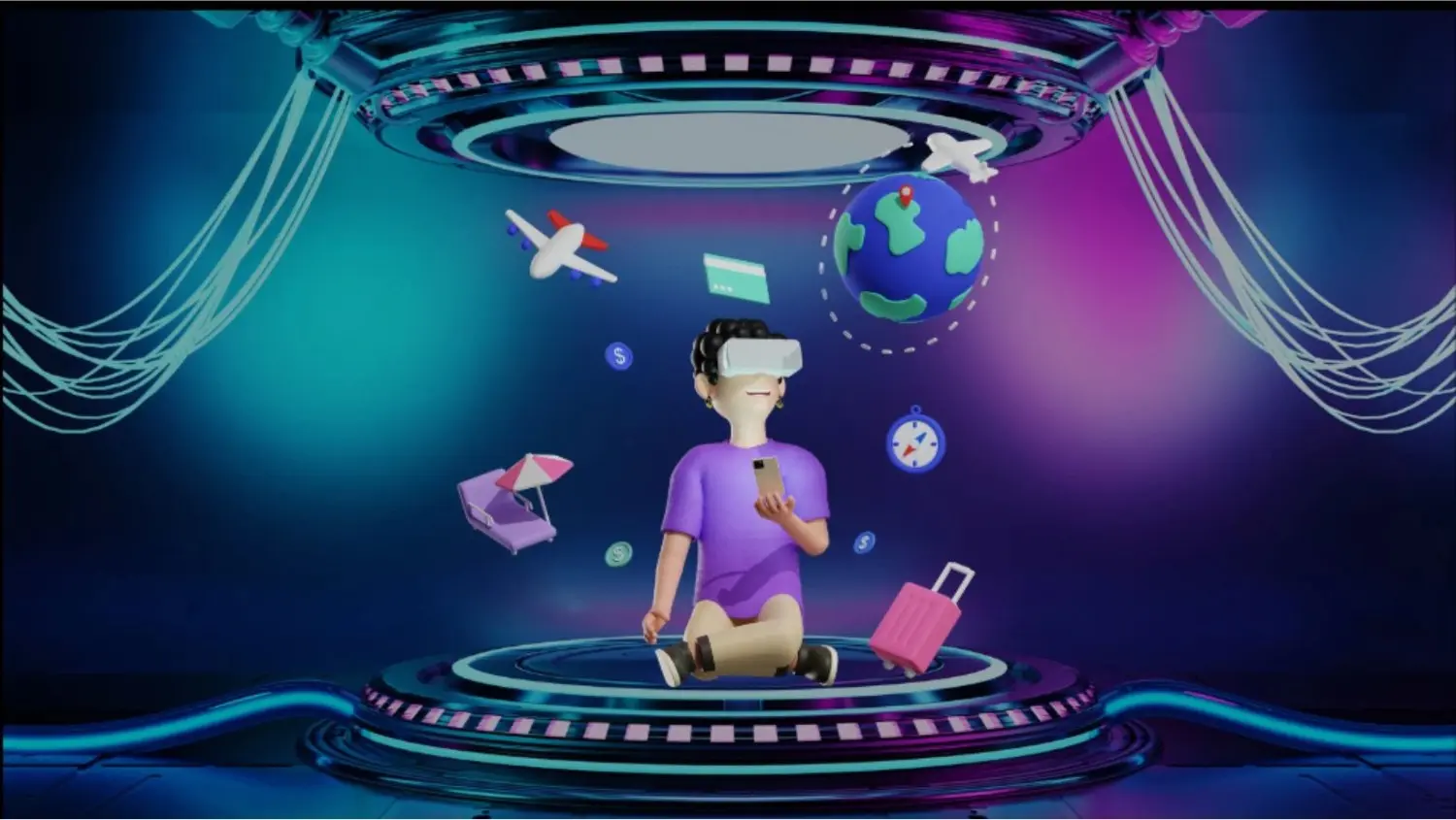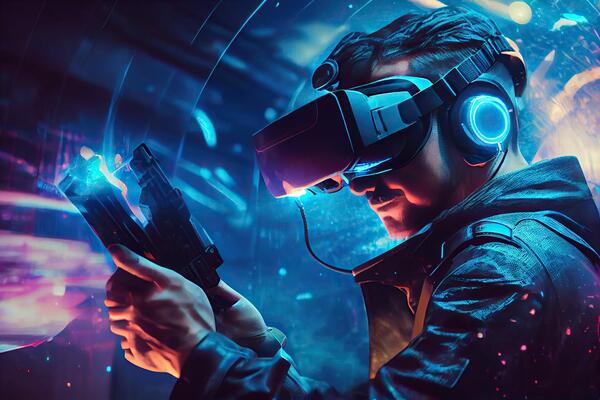Introduction
The metaverse is reshaping the eCommerce industry in once unimaginable ways. Innovative brands like Warby Parker are pioneering AR technology, allowing customers to virtually try on products before making a purchase, all from the comfort of their homes. This only scratches what the metaverse offers in transforming digital commerce.
With its potential to revolutionize the eCommerce landscape, the metaverse is making the seamless integration of digital and physical experiences more accessible than ever. Brands are creating immersive worlds where customers can interact with products and services in unprecedented ways. Personalized recommendations, advanced delivery options, and the integration of NFT Marketplace Development are just a few examples of how the metaverse can transform eCommerce. Technologies like Blockchain Development and Custom Blockchain Development also play a crucial role in building trust and transparency in these virtual ecosystems.
As Web3 Development Companies explore the potential of Web3 Marketplace Development, VR and AR in eCommerce create immersive shopping experiences. The next evolution is embedding these technologies within the metaverse, offering customers a personalized, 24/7 interactive environment. For businesses, this opens the door to game-changing opportunities such as Metaverse NFT Game Development and other innovative strategies that will redefine customer engagement.
According to Gartner research, by 2030, more than a quarter of consumers will spend at least an hour a day in the metaverse. This presents a pressing opportunity for businesses to engage with their audience in this new, immersive space. With projections estimating the metaverse’s value to reach $201.80 billion by 2030, the time to adapt your eCommerce strategy is now. Whether through Web3 App Development Companies or blockchain-based infrastructures, embracing these trends can propel your business into the future.

With this informative post, you can embark on a trip to uncover the wonders of the metaverse in eCommerce. We’ll look at every part of this fascinating new world, and see how it can totally change the way we interact with brands in virtual spaces.
Not only that, but we’ll look at how metaverse eCommerce development will play a key role in determining the future of brand experiences. So get along with us as we explore the metaverse’s infinite possibilities.
Metaverse in E-Commerce
“Metaverse is the next frontier of eCommerce, offering unparalleled opportunities for brands to connect with customers in a way that is immersive, personalized, and unforgettable.” – Jeff Bezos, Founder of Amazon
Welcome to the exciting world of the Metaverse – a virtual reality universe that expands beyond the limits of physical barriers. It’s a technological marvel that mixes augmented reality, virtual reality, blockchain, cryptocurrency, and social commerce to create a space where users can shop, play, and interact with their peers in novel ways.
Consider a world in which you may bring your computer avatar to life and engage in an infinite number of acts and interactions. This is now possible due to the Metaverse. Virtual reality immerses people in a wholly synthetic environment, whereas augmented reality overlays digital information onto the actual world. The Metaverse takes this a step further by allowing you to construct a digital character that interacts with others in a 3D realm that is only restricted by your imagination.
Our most recent blog, “Metaverse Virtual Experiences All Questions Answered,” will provide you all the information you need to completely understand this intriguing new concept.
The existing 2D eCommerce model prevents businesses from making physical relationships with people, allowing only passive information consumption. However, the Metaverse offers a once-in-a-lifetime chance for digital commerce to transform the way we interact with customers.
In the Metaverse, meta-commerce allows customers to fully immerse themselves in a brand’s culture, design, and branding components. This goes beyond the impact of logos and banners and allows customers to acquire a sense of loyalty and trust by experiencing a company’s own personality. Ultimately, this can lead to higher sales and brand recognition for Metaverse eCommerce enterprises.
So, enter the Metaverse and explore a world of infinite possibilities!
Transform Your Business: Metaverse App Development Awaits!

Metaverse Revolutionizes Online Shopping: A New Era of eCommerce Experience
The intersection of eCommerce with the metaverse has been a game changer, creating exciting new opportunities for users to research items and services before making an online purchase. This explosion of possibility has pushed savvy eCommerce organisations to leverage the power of metaverse development services in order to fascinate their clients and stay ahead of the competition. Businesses who have used this cutting-edge technology have witnessed a significant increase in both customer satisfaction and sales.
Join us now as we delve into the boundless potential of the metaverse for the eCommerce industry. Discover the numerous opportunities that await you!
1. Virtual Showrooms
Retailers can use the Metaverse to create immersive virtual showrooms where customers can browse products and make purchases in a highly dynamic and engaging environment. This provides merchants with the opportunity to develop a distinct shopping experience that distinguishes them from their competition and can drive sales.
Nike is one example of a business with its own online store. 2019 saw the launch of Nike Adventure Club, a virtual store that lets users purchase children’s shoes within an immersive digital environment. Before making a purchase, customers can create avatars, browse the store, and virtually try on shoes. The online shop also provides real-time feedback on sizing and fit and makes personalised recommendations based on client preferences. Nike Adventure Club is a fantastic illustration of how a business can use the Metaverse to give its customers a distinctive and interesting buying experience.
2. Product Customization
In the Metaverse, users may build personalised avatars and interact in real-time with virtual objects, allowing them to preview how a product might look and feel before purchasing it. This allows merchants to create personalised items that respond to individual preferences, hence enhancing consumer happiness and loyalty.
Gucci launched a virtual store in Roblox, a popular online gaming platform, in 2021. The virtual store allows customers to create personalised avatars and interact with virtual Gucci items in real time. Customers can explore and purchase limited-edition Gucci items such as handbags, trainers and accessories. The virtual store also provides interactive experiences such as a virtual garden and a virtual runway show. Gucci hopes to increase customer satisfaction and loyalty by providing this immersive and personalised shopping experience. Gucci has a great potential to reach a new generation of customers and create a purchasing experience that goes beyond regular e-commerce through the Metaverse.
3. Social Shopping
The Metaverse offers a social environment for shoppers to participate and share their buying experiences. This allows merchants to build a community around their brand and products, which can lead to increased brand loyalty and advocacy.
Sephora has launched a virtual experience in the Metaverse called Sephora Beauty Wonderland. The virtual experience provides a social atmosphere in which buyers may take virtual makeup tutorials, engage with other beauty enthusiasts, and share their buying experiences. Sephora Beauty Wonderland allows Sephora to create a community around its brand and products, which can lead to increased brand loyalty and advocacy. Sephora strives to engage its clients in a fresh and novel way by providing an immersive and social shopping experience, which can help increase sales and establish a loyal customer base.
4. Virtual Events
The Metaverse allows you to host virtual events like product launches, fashion exhibitions, and trade shows. These events have the potential to reach a worldwide audience while also providing an immersive experience that can engage customers and generate buzz about a brand or product.
In 2021, Samsung staged a virtual event named “Galaxy Unpacked: Virtual Experience” in the Metaverse. The event served as a virtual introduction to Samsung’s new products, which included the Galaxy Z Fold3 and Galaxy Z Flip3 smartphones. The virtual event took place in the virtual world “Samsung Island” and included interactive experiences like product displays, a virtual showroom, and a virtual concert. Samsung was able to reach a global audience and deliver an immersive experience that engaged customers and generated excitement about their products by presenting this virtual event in the Metaverse. The Metaverse allows firms like Samsung to create highly participatory and engaging virtual events, which can help boost sales and build brand awareness.
Unlock Innovation: Explore Metaverse NFT Game Development!

5. Data Analytics
The Metaverse delivers a wealth of information on customer behaviour and preferences, allowing retailers to acquire important insights into their customers’ purchasing habits and preferences. This data can be utilised to improve product offers, marketing efforts, and consumer interactions.
Amazon has been exploring the use of the Metaverse to gather information about customer behavior and preferences. Amazon can track how customers engage with virtual products and locations in the Metaverse, providing important insights into their purchasing habits and preferences. This information can subsequently be utilised to improve Amazon’s product offers, marketing campaigns, and customer interactions. By leveraging the data collected in the Metaverse, Amazon can gain a deeper understanding of its customers, which can help to drive sales and build brand loyalty. The Metaverse gives corporations like Amazon a strong tool for collecting data on user behaviour, allowing them to make better decisions and provide better products and services to their customers.
6. Blockchain-based Payments
Using blockchain-based payment systems, the Metaverse enables smooth and safe transactions. This allows businesses to provide a seamless payment experience that is fast, secure, and transparent, lowering the risk of fraud and enhancing customer trust.
Overstock is an online store that accepts cryptocurrency payments for product purchases. To ensure that transactions are secure, transparent, and quick, Overstock employs a blockchain-based payment system. Customers can purchase things on Overstock’s platform using multiple cryptocurrencies such as Bitcoin and Ethereum, and blockchain technology ensures that transactions are executed fast and securely without the need for intermediaries or middlemen such as banks. Overstock provides a seamless payment experience that is fast, secure, and transparent by utilising blockchain-based payment solutions, which helps to increase customer trust and lower the risk of fraud. Overstock is an excellent illustration of how the Metaverse may be utilised to provide safe and dependable e-commerce transactions.
Explore our other insights!

How will Metaverse Change the Education Sector?
Introduction Metaverse in Education Sector: The Metaverse is limited to games and there are many things the Metaverse

How will Metaverse Transform the Travel and Tourism Sector?
Introduction Metaverse in Travel and Tourism Sector: The coronavirus pandemic has revealed one way the travel industry can

How will the Metaverse Change the Healthcare Industry?
Introduction Metaverse in the Healthcare Industry: Technological advances in the field of mental health assist healthcare facilities in
Metaverse Technology - Use Cases
Discover the dynamic trio that is reshaping the Metaverse’s future of eCommerce! The possibilities are limitless with the combination of three cutting-edge technologies: Extended Reality, Blockchain and NFTs.
Extended Reality
Extended Reality, often known as XR, is one of the most fascinating use cases in this area since it includes amazing immersive experiences like Virtual Reality (VR) and Augmented Reality (AR).
Beyond our wildest expectations, the Metaverse exists, and it is made possible in large part by XR. By directly affecting our senses, these technologies take our virtual experiences to a whole new level. Visuals in 3D that seem to jump off the screen or a 3D surround sound experience that is completely immersive come to mind.
Without XR, the Metaverse would continue to exist just in our fantasies and in the realm of science fiction. But with XR, it becomes a reality, blurring the space between the real and virtual worlds in ways we never thought possible. So, get ready for an unparalleled experience with eCommerce in the Metaverse!
Partner with the Leading Metaverse Game Development Company!

Blockchain
In a world where online security is a major worry, Blockchain delivers a transparent, decentralised solution that ensures complete peace of mind. With a dependable and secure payment gateway in place, you can put an end to security concerns for good!
But that’s not all; blockchain also enhances supply chain management and general efficiency, making it a must-have tool for businesses all over the world. Buyers, sellers, logistics providers, and other entities can now be connected via B2B trading platforms, paving the way for enhanced operational efficiency and streamlined operations.
Blockchain, as a major component of web 3.0, shares many parallels with the Metaverse, and the two are propelling the digital economy forward. Our most recent blog article provides useful insights into evolving industry trends and how to match your workforce plans to stay ahead of the competition. Join the revolution and embrace Blockchain’s boundless possibilities in the Metaverse!
NFTs
Non-Fungible Tokens (NFTs), a game-changing technology utilised by famous fashion, gaming, sports, and music firms to demonstrate ownership of one-of-a-kind digital assets. Consider Nike, which has linked a tangible pair of sneakers to its digital counterpart on its Metaverse eCommerce platform. With NFTs, the possibilities are unlimited, from selling digital collectibles and pre-launching things to producing digital replicas and strengthening customer loyalty through fan tokens or blockchain-based loyalty cards.
NFTs are the best tool for organisations trying to remain ahead of the competition and create unique consumer experiences. You may use NFTs to highlight your brand’s inventiveness and authenticity, giving your customers a really exclusive experience that keeps them coming back for more. So, what are you holding out for? Join the NFT revolution and explore the boundless opportunities for eCommerce in the Metaverse!
Conclusion
As immersive metaverse experiences continue to gain popularity, their impact on the future of eCommerce is set to be transformative. From virtual stores to augmented reality try-ons, the possibilities for integrating metaverse technology into online shopping are vast. Whether through Metaverse NFT Game Development, creating interactive shopping environments, or leveraging Web3 Development Companies to build decentralized platforms, the potential is immense. Blockchain Development and Custom Blockchain Development offer secure and transparent systems to enhance trust in these digital spaces.
However, privacy, security, and accessibility must be addressed. Businesses venturing into the metaverse must balance innovation and ethical considerations to provide a seamless, secure, and sustainable customer experience. By partnering with a Web3 App Development Company or exploring opportunities in NFT Marketplace Development and Web3 Marketplace Development, companies can navigate this evolving landscape and position themselves at the forefront of the future of eCommerce.
FAQs
1. What is the Metaverse, and how does it relate to e-commerce?
A virtual world that consists of numerous interconnected virtual areas is called the Metaverse. By building virtual storefronts, holding online gatherings, and allowing product trials and purchases inside the virtual setting, e-commerce can be integrated into the Metaverse.
2. What advantages does e-commerce have when using Metaverse technology?
Enhanced brand exposure, wider product offers, and more customer involvement are all advantages of integrating Metaverse technology into e-commerce. Customers may benefit from more interactive and immersive shopping experiences thanks to metaverse experiences.
3. What possible negative aspects of using the Metaverse for online shopping?
Concerns about data privacy and security, accessibility for users with disabilities, and potential problems with addiction or over-reliance on virtual experiences are a few potential downsides of using the Metaverse for e-commerce.
4. How can companies guarantee that their Metaverse e-commerce operations are morally and environmentally responsible?
By ensuring that user data is secure and protected, designing virtual experiences that are accessible for all users, and balancing virtual experiences with real-world experiences to avoid over-reliance on virtual environments, businesses can prioritise ethical and sustainable Metaverse e-commerce experiences.
5. What changes are expected to see in e-commerce as the Metaverse develops?
Businesses will likely create virtual shops and provide clients with a larger variety of virtual experiences in the future, as e-commerce is anticipated to become more and more integrated with Metaverse experiences. The difference between the virtual and real worlds may become even hazier as technology develops and virtual experiences grow more realistic and engaging.



